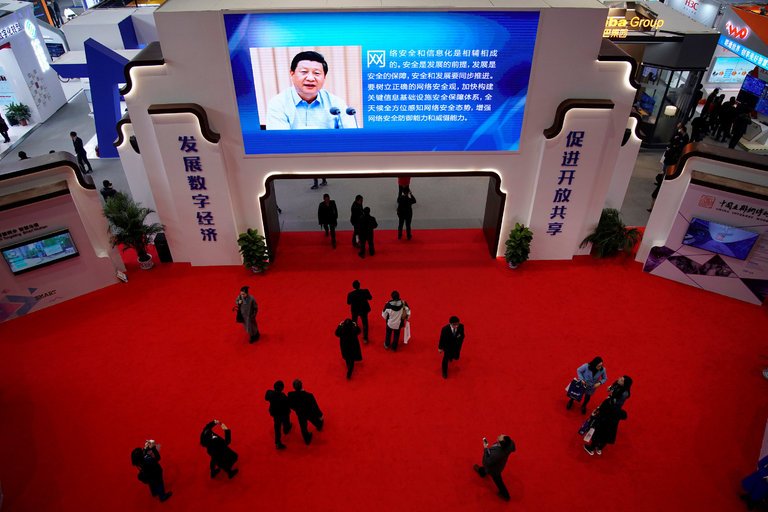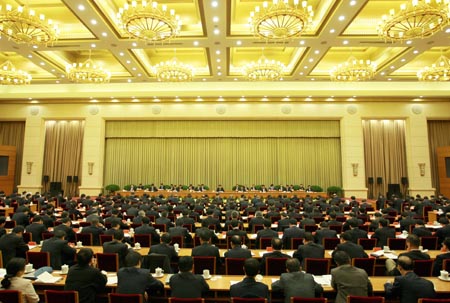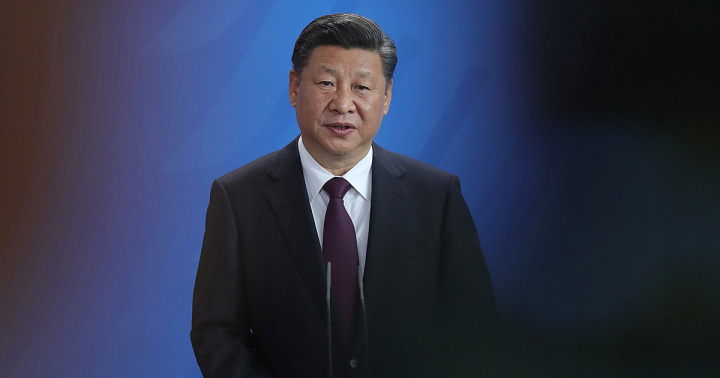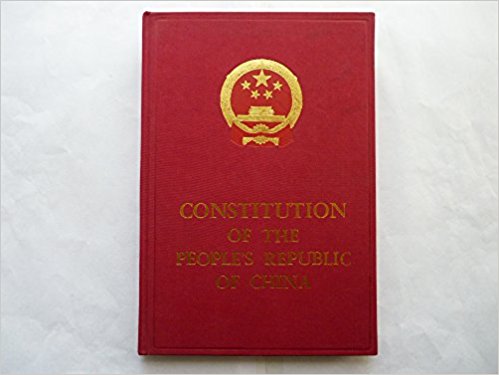
 China Boasts its Technology Chops at the 4th Annual World Internet Conference
China Boasts its Technology Chops at the 4th Annual World Internet ConferenceOn Sunday, China's fourth annual World Internet Conference commenced in scenic Wuzhen. The annual gathering is organized by the Cyberspace Administration of China to discuss internet policies and is primarily used as a platform to promote the internet under President Xi's notion of cyber sovereignty.
Despite the perceived controversies, this year's conference featured some of the world's top technology leaders including Apple CEO Tim Cook and Google CEO Sudar Pichai – marking the first time heads of the major U.S. companies have attended the event. Cook's surprise keynote address was criticized by many in the West who viewed his speech as an endorsement of the closed version of the internet in China. "From my American mindset, I believe strongly in freedoms. They are at the core of what being an American is, and I have no confusion on that," responded Cook. "But I also know that every country in the world decides their laws and regulations."
The spectacle appeared to be a paradox on multiple levels. Some of the headlines surrounding the event celebrated China's hint at a more open cyberspace, while others saw it as a stark defense of China's state-controlled system of censorship. One New York Times journalist inside the conference described the new technology demonstrations as "worthy of both wonder and worry." New advancements in facial recognition, tracking, and drones left observers awestruck at China's technological prowess, but others voiced their concern at the direction this technology is heading.
Wang Huning, Executive Secretary of the Secretariat of the CCP Central Committee, who is an often unseen but incredibly influential adviser to President Xi, emphasized the need for tighter internet censorship and the need for foreign governments to respect China's cyber sovereignty, in his first major speech since joining the Politburo Standing Committee. He said the international community had "warmly received" Xi's ideas about the internet.
One certainty is that the United States can no longer discount China's role in the global internet.
 New Economic Policies Coming Down the Pipeline?
New Economic Policies Coming Down the Pipeline?China-experts and international commentators have their eyes and ears set on an important year-end economic conference happening in Beijing over the next few weeks, which is likely to yield important policy outcomes in the areas of GDP target-setting, poverty alleviation, supply-side reform and the management of economic risk. The Central Economic Work Conference, which is usually convened annually in December, is a meeting of key economic policymakers to set economic targets and policy goals for the coming year.
Ahead of the meeting, the Politburo met to discuss key goals for 2018, and released a document (in English, in Chinese) which indicates that the government is interested in reducing risks in the financial system, reforming the housing system, reducing pollution, and focusing on "high quality" growth.
Wang Tao, head of China economic research at UBS Group AG in Hong Kong, predicts that the conference will result in "prudent and neutral" monetary policy stances, like last year's conference, rather than in potentially drastic measures. She believes that the government will set a slightly lower growth target for 2018, which would tie in with President Xi Jinping's "move away from the longstanding tradition of setting annual GDP growth targets for the Chinese economy," at the 19th Party Congress, as a China-US Focus contributor argued.
However, the current leadership will still have to balance its debt reduction measures with meeting the long term goal set by the previous administration of doubling GDP by 2020 to turn China into a "modestly prosperous" nation, while also keeping financial markets steady. A delicate task for the newly-minted leadership -- and one that comes at a time when China is facing many other economic challenges, including questions over its World Trade Organization "market economy" status and tensions with the Trump administration over its Sections 301 and 337 trade investigations.
 Xi Jinping: Number 3 Person of the Year 2017
Xi Jinping: Number 3 Person of the Year 2017In an article that opened with the line, "Sometimes things just seem to go your way," TIME Magazine declared President Xi Jinping Number 3 Person of the Year 2017. "In 2017, Chinese President Xi Jinping strengthened his hold over the world's most populous nation, was inducted into the pantheon of party leaders beside Mao Zedong and Deng Xiaoping and—small detail—announced that China henceforth intends to lead the world," TIME wrote.
Interestingly, President Xi was a place behind President Trump, who occupies the number two spot this year. Trump's TIME biography proclaimed his "contribution" this year as "chang[ing] the rules of the presidency." The author wrote, "From Washington to Wall Street, Peoria to Pyongyang, late-night television to social media, much of the world revolves around the Trump show."
However, experts might disagree with TIME's assessment of the relative influence of presidents Xi and Trump, especially when considering the two leaders' high-level "showdown" this year while Trump was on a presidential trip to Beijing. "Trump emerged looking like a supplicant, whereas Xi came off looking like the head of a coequal great power," China-US Focus contributor Mel Gurtov wrote. Famously, New York Times columnist Thomas Friedman commented that President Xi could "Sell Trump the Brooklyn Bridge." In an article for China-US Focus, Doug Bandow argued, "Compare presidents and America loses. By all appearances, President Xi is serious, determined, and competent; he knows both privilege and hardship; he even lived in America, now his country's chief adversary."
Quite apart from this potential debate, it is interesting to reflect on the level that personalities have an effect on bilateral relationships, such as the one between the U.S. and China.
 This Week in Chinese History
This Week in Chinese HistoryDuring this week in Chinese history, the Constitution Of The People's Republic Of China was adopted, by special Announcement of the National People's Congress on December 4, 1982.
Three previous state constitutions preceded this one, but were superseded by the new version, which contains articles such as, "All power in the People's Republic of China belongs to the people," (Article 2), "The People's Republic of China permits foreign enterprises, other foreign economic organizations and individual foreigners to invest in China and to enter into various forms of economic cooperation with Chinese enterprises," (Article 18) and "Citizens of the People's Republic of China enjoy freedom of speech, of the press, of assembly, of association, of procession and of demonstration," (Article 35.)
Since then, the document has undergone several separate revisions, such as in 2004 to specify the country's national anthem.
Prepared by China-US Focus editorial teams in Hong Kong and New York, this weekly newsletter offers you snap shots of latest trends and developments emerging from China every week, while adding a dose of historical perspective.
- 2017-12-01 The Future of the China-US Economic Relationship
- 2017-11-17 The “Indo Pacific”: A New American Strategy for Asia?
- 2017-11-10 President Trump Revels in China’s State-Visit Red Carpet Treatment
- 2017-11-03 Will China Display Hard or Soft Power in the Era of Xi?
- 2017-10-27 All Eyes on Xi
- 2017-10-20 The 19th Party Congress Begins
- 2017-10-13 Tech Titans
- 2017-10-06 China’s Super Golden Week
- 2017-09-29 All Quiet on North Korea’s Western Front?
- 2017-09-22 Back Together and Better than Ever: Renewed Sino-Russian Relations
- 2017-09-15 China positions itself to dominate the industries of the future
- 2017-09-08 Did North Korea just test a hydrogen bomb?
- 2017-09-01 Are Forced Technology Transfers Forcing the U.S. and China to Rethink How They Do Business?
- 2017-08-25 Bannon Out: What now for the China-US relationship?
- 2017-08-18 Trump Launches “Investigation on Whether to Investigate” China’s IP Laws
- 2017-08-11 Threats of "Fire and Fury" on the Korean Peninsula
- 2017-08-04 Trump Administration Plans Trade Actions Against China
- 2017-07-28 Xi to Dominate the 19th CPC Congress
- 2017-07-21 A Steely Comprehensive Economic Dialogue
- 2017-07-14 South China Sea Arbitral Award after One Year
